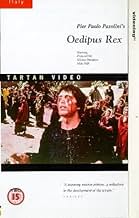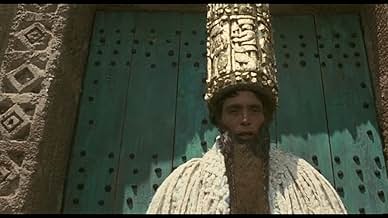NOTE IMDb
7,2/10
7,3 k
MA NOTE
Sauvé de l'abandon et élevé par le roi et la reine, Œdipe est toujours hanté par une prophétie: il tuera son père et épousera sa mère.Sauvé de l'abandon et élevé par le roi et la reine, Œdipe est toujours hanté par une prophétie: il tuera son père et épousera sa mère.Sauvé de l'abandon et élevé par le roi et la reine, Œdipe est toujours hanté par une prophétie: il tuera son père et épousera sa mère.
- Réalisation
- Scénario
- Casting principal
- Récompenses
- 4 victoires et 4 nominations au total
Giovanni Ivan Scratuglia
- Sacerdote
- (as Ivan Scratuglia)
Laura Betti
- Jocasta's Maid
- (non crédité)
Pier Paolo Pasolini
- High Priest
- (non crédité)
Isabel Ruth
- Jocasta's Maid with a Lamb
- (non crédité)
Avis à la une
We do ourselves no favour by fixating on how well a film uses every little detail and line in an original text. Certainly, by those standards this is a mediocre, and possibly lazy, film at best. But at the same time there is the problem of being so liberal in one's adaptation that every goes sour, the latest attempt at "Vanity Fair" is a perfect example. But this film, along with Bresson's "Pickpocket," should stand as the rules of adaptation for every young director. Both films are very interpretative, but the directors aren't so naive as to think that mere plot details can constitute a film. So what pushes this film beyond a mere surface-level adaptation? In this case, it takes a deep insight into the nature of Greek tragedy itself. Tragedy's dualism (the representational and the chaotic) is prevalent in all Pasolini's works, it was especially essential in his "Gospel," and I was excited to see how it played out in its own source, and the results are absolutely fantastic. Visually imaginative and so intellectually superior to its contemporaries it seems out of place in film.
5 out of 5 - Essential
5 out of 5 - Essential
Sophocles' Oedipus Rex is adapted well for the foreign screen. Pasolini, better known for the controversial Salo; 120 Days of Sodom, has kept the intensity level to a minimum while still presenting the perverse qualities for which he would be known for. If you don't know the story (like who doesn't) read the play before seeing the movie - there tends to be a shortage on literature freaks these days. Beautifully filmed, Oedipus Rex begins in modern times, continues sometime BC, and finally ends back in the 20th century; thus presenting a sociological thesis for the viewer. The acting is a bit hammy (seeing Oedipus with a mad streak can be over the top) although the characters are developed well and recite their lines as if on stage. My only complaint is the subtitles seem to blend in with the scenery --- white subtitles against a white background. Therefore, this flaw makes it difficult to enjoy some scenes, and Pasolini's poetry is usually superb. Nevertheless, it's still a great film and is worth a look, especially by people with preconceived hatred for Pasolini's later work -and there's definitely a lot out there.
Oedipus Rex: Oedipus Rex is a haunting experience. The final scene on the city streets is enchanting. The scene in which Oedipus kills three Roman guards is one of the finest tapestries of tension and viscera in cinema. The acting isn't worth mentioning; this film is Pasolini's triumph. It is mainly a triumph of striking and occasionally nauseating imagery. The shifts in time periods are rather tacky and simplistic in retrospect; they are done so gracefully though. The conclusion is pulled together with beautifully written dialogue that only Paolo Pasolini could deliver. The film is not one that is easily forgotten and is sure to be remembered for a long time.
Pier Paolo Pasolini's Oedipus Rex is a relatively faithful adaptation of Sophocles' Greek tragedy Oedipus the King. Beginning in 1920's Italy, a baby boy is born and is instantly envied by the displaced father. The setting then changes to ancient times, where a baby boy is being carried out into the desert by a servant to be left out to die from exposure. He is eventually picked up by a shepherd, who takes him back to the King and Queen of Corinth, who adopt the youngster and love him like one of their own. The child grows up to be Edipo (Pasolini's frequent collaborator Franco Citti), an arrogant youth who wishes to see the world for himself. And so he set out on the road to Thebes, the place of his birth.
Plagued by a prophecy that dictates he is destined to murder his father and marry his mother, Edipo is a tortured but intuitive soul. He murders a rich man and his guards after they demand he clear a path for them on the road, and later frees a town from the clutches of a Sphinx by solving its riddle. Staying true to his own recognisable style, Pasolini tells the story of Oedipus not with a sweeping narrative, but through a collection of comedic, violent and often surreal vignettes, the most bizarre and ultimately thrilling being the scene in which Edipo murders the guards. He runs away from them as they chase him, before charging at them one by one and cutting them down. It's a moment without any real motivational insight, offering but a glimpse into Edipo's damaged psyche.
Post-Freud, the story of Oedipus cannot be experienced without reading into the incestuous and patricidal undertones. But these themes are less explored by Pasolini than the idea of Edipo being ultimately responsible for his own downfall. Rather than the inevitability of fate, Edipo creates his own path, committing murder on a whim and marrying while blinded by ambition. For a bulk of the film, Pasolini keeps the audience at arm's length, favouring his own brushes of surrealism over a traditional narrative. While this may be occasionally frustrating - the pre-war scenes than book-end the film seem out of place and confusing - Citti's wide-eyed performance is a fantastic distraction, and the Moroccan scenery helps provide a ghostly, Biblical atmosphere as well as a beautiful backdrop.
Plagued by a prophecy that dictates he is destined to murder his father and marry his mother, Edipo is a tortured but intuitive soul. He murders a rich man and his guards after they demand he clear a path for them on the road, and later frees a town from the clutches of a Sphinx by solving its riddle. Staying true to his own recognisable style, Pasolini tells the story of Oedipus not with a sweeping narrative, but through a collection of comedic, violent and often surreal vignettes, the most bizarre and ultimately thrilling being the scene in which Edipo murders the guards. He runs away from them as they chase him, before charging at them one by one and cutting them down. It's a moment without any real motivational insight, offering but a glimpse into Edipo's damaged psyche.
Post-Freud, the story of Oedipus cannot be experienced without reading into the incestuous and patricidal undertones. But these themes are less explored by Pasolini than the idea of Edipo being ultimately responsible for his own downfall. Rather than the inevitability of fate, Edipo creates his own path, committing murder on a whim and marrying while blinded by ambition. For a bulk of the film, Pasolini keeps the audience at arm's length, favouring his own brushes of surrealism over a traditional narrative. While this may be occasionally frustrating - the pre-war scenes than book-end the film seem out of place and confusing - Citti's wide-eyed performance is a fantastic distraction, and the Moroccan scenery helps provide a ghostly, Biblical atmosphere as well as a beautiful backdrop.
Pasolini tells the drama of a man who knows his destiny from the beginning but does not accept the awareness of evil, tries to escape an atrocious future, but is inevitably entangled in it. The director uses Oedipus, of a classic archetype, to tell the human condition, the inadequacy of those who know they must die, but are unable to accept it.
The Moroccan setting that hides a fantasy Greece, between desert and villages of shepherds, mountains, cities built with clay and destroyed by plagues, is wonderful. A film written in images, dialogues reduced to the essentials, use of captions as in the silent era, intense photography and - for the first time in a Pasolini film - use of color that renders the ocher chromatism of the desert well.
The film have some substantial flaws, especially the storytelling. But the great Pasolini-style shine's brightly throughout the film and Franco Citti is just amazing as Edipo himself.
The Moroccan setting that hides a fantasy Greece, between desert and villages of shepherds, mountains, cities built with clay and destroyed by plagues, is wonderful. A film written in images, dialogues reduced to the essentials, use of captions as in the silent era, intense photography and - for the first time in a Pasolini film - use of color that renders the ocher chromatism of the desert well.
The film have some substantial flaws, especially the storytelling. But the great Pasolini-style shine's brightly throughout the film and Franco Citti is just amazing as Edipo himself.
Le saviez-vous
- ConnexionsEdited into Dias de Nietzsche em Turim (2001)
Meilleurs choix
Connectez-vous pour évaluer et suivre la liste de favoris afin de recevoir des recommandations personnalisées
- How long is Oedipus Rex?Alimenté par Alexa
Détails
- Date de sortie
- Pays d’origine
- Langues
- Aussi connu sous le nom de
- Edipo, el hijo de la fortuna
- Lieux de tournage
- Sociétés de production
- Voir plus de crédits d'entreprise sur IMDbPro
Box-office
- Montant brut mondial
- 2 364 $US
- Durée
- 1h 44min(104 min)
- Rapport de forme
- 1.85 : 1
Contribuer à cette page
Suggérer une modification ou ajouter du contenu manquant

































